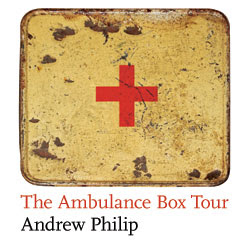I can't help but think that last night's Shore Poets event could have shown some of Thursday night's slammers a thing or two about how imaginative and contentful something that might be described as a performance poem can be. Nowhere was that more the case than in the closing set, from the night's main reader, WN Herbert.
Bill Herbert would be a hard man to beat in a slam. He has always been a poet of many guises, a writer with a flair and versatility few can match. Ballads, sonnets or blues; rhymed or unrhymed poetry; metred or free verse; lyric or narrative; surreal or realist; tender, witty, erudite or scatalogical--this man can do it all with equal aplomb and intelligence. And he does it in Scots, English and all the fluid gradations between the two sibling languages.
Bill's set last night leant heavily towards the more performancy end of his writing, especially with his early poem "Talking Water Blues" and the title poem from his most recent collection, "Bad Shaman Blues". Both push the blues into unexpected places. Don't think of Auden's use of the form. Or, if you do, think of it crossed with MacDiarmid and dropping acid like chocolate buttons. "Cognitive freefall" is how I once heard him describe his writing technique. That's maybe not a bad description of the imaginative riot at the heart of the work, but it belies the degree of effortless craft in the poems.
June's Shore poet was Angela McSeveney. Angela is a much less showy writer than Bill Herbert, but her performance was no less assured or sparky than his. She delivered the night's most memorable piece--a vivid, hugely entertaining poem about slaughtering beetroot, which she dedicated to Hamish Whyte who had just celebrated a significant birthday. Her set was packed with gems of her clear, honed, crystalline writing.
The opener this month was Dorothy Baird, whose new collection is just coming out with Two Ravens Press. A good, assured set. I particularly liked "The Cry of the Night Child" and the poem of hers built on the conceit that dawn is the only word for the dawn in English. She spoilt the conceit slightly by saying "dawn is the only word for the sunrise in English", but the poem was good nonetheless.
The music was from three lassies from the Edinburgh Youth Gaitherin, a traditional music project. Ailsa, Becky and Mairi (I didn't get their surnames) must be in their early 20s at most but are already accomplished traditional singers and treated us to three excellent sets of Scots, English and Irish songs.
Usually, the Shore Poets season finishes in June. However, this year, we have a special event in July for our Orkney exchange. The shame is that, although I'm going to Orkney on the exchange in October, I won't make it to next month's reading because I'll be heading off to this Arvon course. Normal Shore Poets service resumes in September, when Polly Clark will be the headliner.

.jpg)





